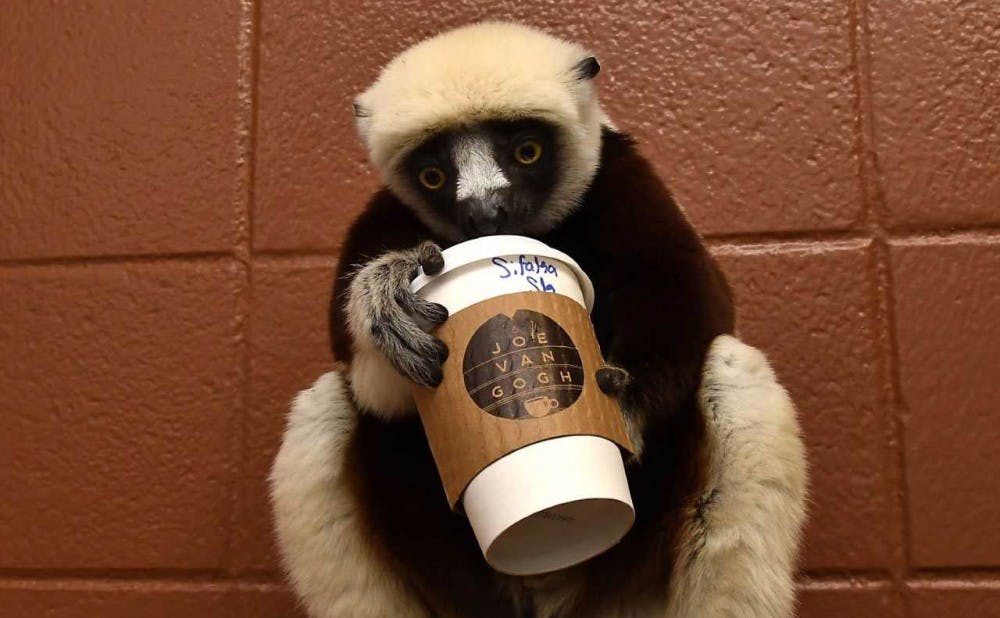Lemur lattes? Don't worry—they're not actually made with the cute little creatures.
From now until the end of November, Joe Van Gogh—a Hillsborough-based coffee shop with one location on West Campus—is serving special Sifaka lattes, named after the Sifaka lemur. The lattes are sweetened with Sifaka syrup, made with lemongrass, cloves, sweet potatoes, star anise and sugar, all of which come from Madagascar—the island native to lemurs.
For each latte purchased, JVG will donate 25 cents to support the Duke Lemur Center, which conducts research on lemurs as well as conservation work in Madagascar.
Sara Clark, director of communications at the DLC, explained that over 94 percent of lemurs in Madagascar are considered threatened while just 10 percent of the original vegetation in Madagascar remains.
She added that the DLC's conservation work is fully funded through grants and private donations, which have recently waned. As such, even small donations such as 25 cents from the purchase of a latte can impact their reach.
The partnership between JVG and the DLC began as a simple conversation. Lydia Greene, a doctoral candidate in ecology who works with the DLC, would speak with JVG employees on campus about lemurs.
Eventually, the JVG employees visited the DLC and were inspired to start a serious collaboration between their coffee shop and the center. Greene placed the JVG staff in contact with Clark, who was supportive of their idea.
“It’s really important to us to be active members of the Duke community,” said Cyndi Patterson, assistant store manager at JVG. “[The partnership] was a great opportunity for Joe Van Gogh—even though it is a small thing, it will have a small ripple across the world.”
Patterson led the JVG staff when they first created the Sifaka syrup from spices that Greene brought back from Madagascar.
After a few trials, the concocters scrapped peppers from the ingredient list and decided on a final syrup. Patterson explained that making the syrup involves blending the sweet potatoes to get sweet potato juice, which is then mixed with equal parts sugar. Following this, cloves, lemongrass and cinnamon are ground together, added to the mixture and turned into a syrup by a rice cooker.
Patterson described the drink as comforting, with a warm, sweet potato vibe that satisfies a sweet-tooth without going overboard.
"The syrup added a sweet taste that you don’t get with normal coffee,” said first-year Mary Wang.
Wang noted that she would buy the drink again because she enjoyed it and also because of its worthy cause.
Patterson said she was initially inspired to use sweet potatoes because they remind her of the holiday season and of her family. She added that lemurs at the DLC are fed sweet potatoes and that the DLC encourages farmers in Madagascar to grow sweet potatoes in place of rice, to help conserve lemur habitats.
Malagasy farmers in Madagascar currently use slash-and-burn agriculture to grow rice, which is harmful for the environment, Clark explained. Slash-and-burn agriculture involves cutting and burning native forest land—which makes up the the lemurs' habitat—for the use of farming.
Clark described how the sustainable farming of yams can help preserve the soil in Madagascar in addition to improving crop yield. As part of their goal, the DLC has established relationships with the Malagasy community and have a Malagasy staff work with the farmers.
“We want to teach them how to grow food sustainably, and that in turn will keep them from hunting the lemurs," Clark said. "We help the people first, and that ultimately helps the lemurs. It’s focused on improving the lives of the Malagasy and not just the animals."
The DLC is working on a new initiative called mixed-use forest that focuses on replanting native trees with commercially valuable crops, she added. This strategy encourages farmers to care for both their crops and the trees native to Madagascar. Additionally, the DLC teaches fish farming, which provides protein and food to families and in turn decreases lemur hunting.
Clark noted that the collaboration with JVG ultimately came to fruition because JVG's values are closely aligned with those of the DLC.
“[JVG] values relationships with local communities, paying a living wage, and not exploiting the farmers. That also ties into our work in Madagascar and our community-based approach to conservation,” she said. “Also local, sustainable farming methods is common between Joe Van Gogh and the DLC.”
Get The Chronicle straight to your inbox
Signup for our weekly newsletter. Cancel at any time.

